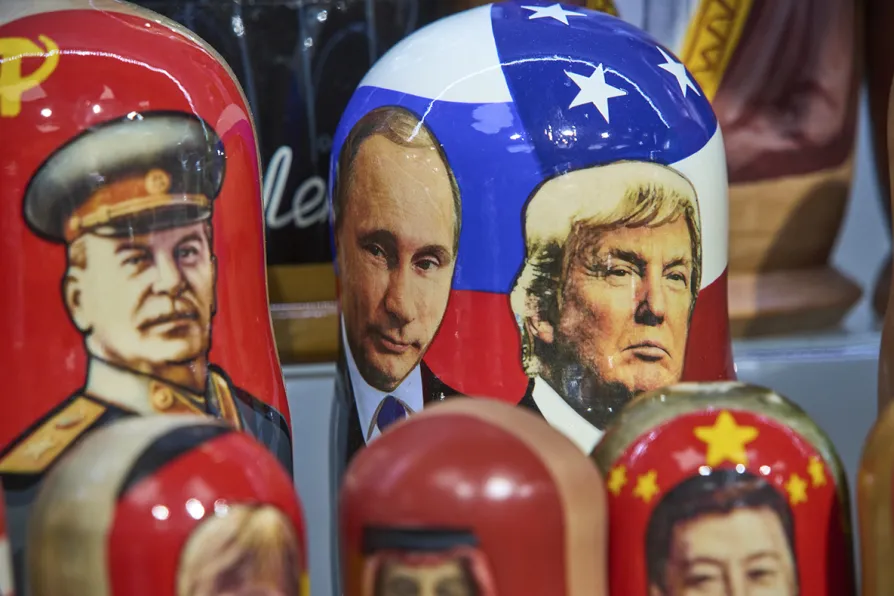
 Traditional Russian wooden dolls called Matryoshka depicting Soviet Leader Josef Stalin (left), Russian President Vladimir Putin (centre), and US President Donald Trump (right) are displayed for sale at a souvenir shop in Moscow, Russia, August 12, 2025
Traditional Russian wooden dolls called Matryoshka depicting Soviet Leader Josef Stalin (left), Russian President Vladimir Putin (centre), and US President Donald Trump (right) are displayed for sale at a souvenir shop in Moscow, Russia, August 12, 2025
THE idea that imperialist countries might have contradictory interests has existed since the 1884 Berlin Conference, which divided Africa.
Germany forfeited its overseas empire as the price of losing the 1914-18 inter-imperialist conflict thus, its subsequent expansionist efforts have focused on eastern Europe and Russia.
German capital is not particularly rapacious in comparison to its rivals, but it has attracted particular opprobrium because its victims have tended to be white and European, whereas the British butcher’s apron, like the republican French tricolour and the Belgian, Italian, Spanish and Portuguese flags, have mostly flown over the bodies of brown and black-skinned people.
We can thus understand why the new German Chancellor Friedrich Merz is hosting a series of virtual meetings in a bid to beef up European support for the embattled Ukrainian President Volodymyr Zelensky in advance of the summit between Donald Trump and Vladimir Putin this Friday.
If they agree on a way to dial down Nato’s proxy war in Ukraine, it will block German capital at a point when the barely subterranean tensions between the US and its European “allies” have already weakened the advantage Germany’s manufacturing has traditionally enjoyed in the EU.
Trump has floated the idea that Ukraine should give up territory to end the war. The most obvious would be the Donbass, which Russia mostly holds and from which it is steadily squeezing the Ukrainian military.
That this territory was ceded by Lenin and Stalin to the Ukrainian Soviet Republic soon after the revolution, and that the present war has its origins in the US-sponsored Maidan coup and the subsequent Ukrainian assault on the largely Russian population, are the reasons Russian is highly unlikely to concede anything here. The same goes for Crimea, which was handed to Soviet socialist Ukraine in the 1950s.
A surprising shaft of reason comes from the hitherto unlikely direction of Nato’s new boss, former Dutch premier Mark Rutte, who argued earlier this month: “When it comes to the entire issue of territory, when it comes to recognition, for example, perhaps in a future agreement, that Russia actually controls part of Ukrainian territory, that must be an actual recognition, not a de jure political recognition.”
Putin’s position is that a ceasefire would start as soon as Ukraine withdrew from four regions mostly occupied by Russia — Donetsk, Luhansk, Kherson and Zaporizhzhia — and he wants Ukraine to end its efforts to join Nato.
Perhaps not surprisingly for the Nato chief, who holds the ring between the North American and the European Nato members, Rutte says Trump’s aim is to reduce casualties and reconstruct Ukraine’s infrastructure. There is little in Zelensky’s rhetoric which meshes with this, and powerful elements in the EU appear to see the conflict continuing indefinitely, with neither a ceasefire or territorial concessions.
Keir Starmer has picked up Boris Johnson’s approach in running interference on measures to dial down the conflict. Johnson infamously flew to Kiev to scupper a likely peace deal, and Starmer co-chaired Wednesday’s conference call with Zelensky, Emmanuel Macron and Merz in advance of the meeting with Trump and his Vice-President JD Vance.
Last weekend, Britain’s lame-duck Foreign Secretary David Lammy hosted a meeting with Ukraine’s hard men Rustem Umerov, secretary of the National Security and Defence Council, and Zelensky’s minder Andriy Yermak, plus officials from Britain, the US, EU, France, Germany, Italy, Finland and Nato.
With Starmer heading the war party, it will be interesting to see whether the EU — plus Britain — has any clout with the US or whether the British bourgeoisie retains anything like a “special relationship” with its transatlantic counterparts.










